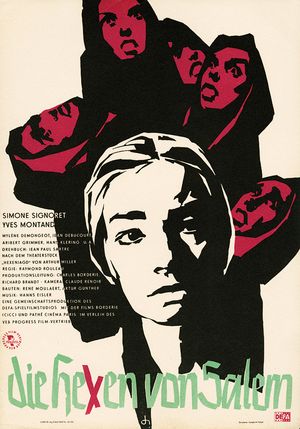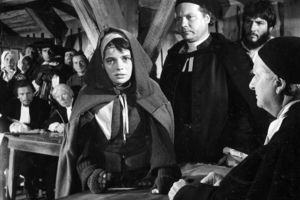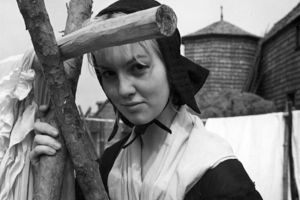Die Hexen von Salem
Director: Raymond Rouleau, 115 Min., Black-White, Feature Film
Deutsche Demokratische Republik (DDR); Frankreich
DEFA-Studio für Spielfilme / Les Films Borderie (C.I.C.C.), Paris / Pathe-Cinema, Paris, 1957
- Film/Video Format
- 35 mm
- Length in m
- 3153
- Other Title
- Les Sorcières de Salem (Französisch)
- English Title
- The Witches of Salem
- Premiere Date
- Release Date (for Cinema)
- Literary Source
- Miller, Arthur: "Hexenjagd", Schauspiel

(Dir.: Raymond Rouleau, 1957) Graphic Design: Bert Heller
Short Summary (English)
1692 is the year that the witchhunt panic erupted in Salem, Massachusetts. The instigator of the witch hunts is Abigail, the-I 6- year-old niece of Pastor Parris, who, while working in the house of Elisabeth and john Proctor, two extremely puritanical farmers, seduced john, who hadn't shared a bed with his sick wife for a long time. Because Abigail now wants john exclusively for herself, his lawful wife is simply in her way. And therefore Abigail puts all her energies into trying to defame Elisabeth so as to eliminate her as a rival.
One night a group of girls meet in the forest and dance themselves into a frenzied state. When Pastor Parris unexpectedly turns up at the scene, the girls immediately fall into a screaming fit, voicing the claim that they have been bewitched. The orthodox Pastor then proceeds to organize a judicial investigation into the charges of witchcraft. Driven by fear, the girls arbitrarily accuse some of the Salem citizens of witchcraft - and one of the accused is none other than Elisabeth Proctor.
Elisabeth is taken into custody and john, who has just had a reconciling talk with his wife, now attempts to secure her freedom by laying bare the unknown reasons for the indictment against her: namely Abigail's intrigue and his own adultery which is regarded in this puritanical area as a mortal sin. In order to save her husband's life, Elisabeth tells the first lie she has ever told - she states that john Proctor did not commit adultery Both Proctors, however, are finally put on trial, and together with some other citizens of Salem, they are sentenced to death. The attempt by the indignant citizenry to save the innocent victims comes to nought, because they have already been secretly executed. Only the life of Elisabeth Proctor is spared because of her pregnancy. (Source: Progress Film-Verleih)

(Dir.: Raymond Rouleau, 1957) Photography: Roger Corbeau

(Dir.: Raymond Rouleau, 1957) Photography: Roger Corbeau
Film Crew
- Director
-
- Raymond Rouleau
- Script
-
- Jean-Paul Sartre
- Camera
-
- Claude Renoir
- Louis Stein (Kameraführung)
- Film Editing
-
- Marguerite Renoir
- Cast
-
- Simone Signoret (Elisabeth Proctor)
- Yves Montand (John Proctor)
- Mylène Demongeot (Abigail)
- Pascale Petit (Mary Warren)
- Sabine Thalbach (Kitty)
- Ursula Körbs (Wolitt)
- Jean Debucourt (Parris)
- Alfred Adam (Thomas Putnam)
- Francoise Lugagne (Frau Putnam)
- Darling Legitimus (Tituba)
- Pierre Larquey (Francis Nurse)
- Aribert Grimmer (Gilles Corey)
- Jeanne Fusier-Gir (Martha Corey)
- Hans Klering (Field)
- Werner Segtrop (Trommler)
- Gerd Michael Henneberg (Herrick)
- Coutant-Lambert (Rebecca Nurse)
- Jean Garven (Peter Corey)
- Jean Amadou (Charly Corey)
- Chantal Gozzi (Fancy Proctor)
- Maritza Telapanian (Ann Putnam)
- Christiane Ferez (Betty Perres)
- Veronique Norday (Mercy Levis)
- Guirvil (Corbet)
- Jean Riveyre (Gildchrist)
- Michel Piccoli (James Putnam)
- Darbou (Nathan)
- Hans-Ulrich Lauffer (Nathan)
- Lode (Barnsteapel)
- Raymond Rouleau (Danforth)
- Gérard Darrieu (Chever)
- Paquerette (Sarah Good)
- Gribst (Notable)
- Kueller (Notable)
- Willi Neuenhagen (Unteroffizier Christopher)
- Horst Kube (Soldat)
- Gustav Püttjer (Schreiber)
- Christoph Beyertt (Schreiber)
- Georg Helge (Spucker Bauer)
- Karl Block (Bauer)
- Albert Zahn (Bauer)
- Heinz Laggies (Bauer)
- Hans-Ulrich Lauffer (Bauer)
- Harald Moszdorf (Bauer)
- Georg Irmer (Bauer)
- Assistant Director
-
- Ruth Fischer (Assistenz-Regie)
- Gérard Renateau
- Paul Nuyttens
- Assistant Camera
-
- Jacques Chotel
- Production Design
-
- René Moulaert
- Artur Günther
- Music
-
- Hanns Eisler
- Georges Auric
- Georges Delerue (Dirigent Orchester)
- Sound
-
- Antoine Petit-Jean
- Costume Design
-
- Lila de Nobili
- Lydia Fiege
- Make-Up
-
- Alex Archambault
- Bernhard Kalisch
- Props
-
- Albert Volper
- Otto Karge
- Production Management
-
- Charles Borderie
- Richard Brandt
- Unit Production Management
-
- Erich Kühne
- André Rameau
- DEFA Photography
-
- Roger Corbeau
- Dubbing (Director)
-
- Johannes Knittel (Deutsche Fassung)
- Dubbing (Author)
-
- Erwin Klein (Deutsche Fassung)
- Dubbing (Dubbing Actor)
-
- Helga Göring (Elisabeth Proctor)
- Robert Trösch (John Proctor)
- Karin von Faber (Abigail)
- Isabell Franke (Mary Warren)
- Alfred Haase (Parris)
- Hans Fiebrandt (Thomas Putnam)
- Elisabeth Mühlen (Frau Putnam)
- Ursula Mundt (Tituba)
- Ernst Riebold (Francis Nurse)
- Erich Nadler (Francis Nurse)
- Margarete Wellhörner (Martha Corey)
- Lilli (auch: Lili; Lilly) Schoenborn (auch: Schönborn; Schönborn-Anspach) (Rebecca Nurse)
- Willi Neuenhahn (Peter Corey)
- Barbara Honigmann (Fancy Proctor)
- Ute Wisnawitzki (Ann Putnam)
- Heidi Pfanne (Betty Perres)
- Renate Hinzelmann (Mercy Levis)
- Günther Ballier (Corbet)
- Johannes Siegert (Gildchrist)
- Uwe Döring (James Putnam)
- Fritz Bohnstedt (Barnsteapel / Bauer mit Hut)
- Wolf Martine (Danforth)
- Kurt Oligmüller (Chever)
- Bella Waldritter (Sarah Good)
- Hannjo Hasse (Hale)
- Maximilian Larsen (Wiellard)
- Otto Krone (Hathorne)
- Sabine Thalbach (Hexe)
- Willi Neuenhagen (Polizist)
- Margarete Auditor (Junge Bäuerin)
- Hans Behnke (Junger Bauer)
- Antje Topel (Kind)
- Ursula Vitt (Kind)
- Dubbing (Sound)
-
- Werner Klein (Deutsche Fassung)
- Georg Gutschmidt (Deutsche Fassung)
- Dubbing (Editing)
-
- Ruth Moegelin (Deutsche Fassung)
Awards
- X. Internationales Filmfestival Karlovy Vary (1957): Preis für hervorragende Gestaltung komplizierter menschlicher Charaktere an - Yves Montand
- X. Internationales Filmfestival Karlovy Vary (1957): Preis für hervorragende Gestaltung komplizierter menschlicher Charaktere an - Simone Signoret
- British Academy (1957): British Academy Award - Simone Signoret
Short Summary (German)
(Koproduktion DDR/Frankreich: Films Borderie (CICC) und Pathé Cinema, Paris)
Salem, Massachusetts, im Jahre 1692. Die schottisch-englischen Puritaner führen ein kärgliches Kolonistenleben, das durch ihre strengen religiösen Sitten zusätzlich erschwert wird. Die Farmersfrau Elisabeth Proctor huldigt einer besonders strengen Frömmigkeit, sodass es der jungen Abigail leichtfällt, deren Ehemann John zu verführen. Um John ganz für sich zu haben, bezichtigt sie Elisabeth der Hexerei, was den Scheiterhaufen bedeutet. John offenbart seinen Ehebruch und die wahren Absichten von Abigail, um seine Frau zu retten. Vergebens. Dem fanatischen Pfarrer Parris und dem Richter Danforth geht es um ein Exempel zur Stärkung ihrer Unterdrückungspolitik, und nicht um Gerechtigkeit. Zusammen mit anderen der Hexerei bezichtigten Frauen wird das Ehepaar Proctor zum Tode verurteilt. Elisabeth aber darf nicht hingerichtet werden, da sie schwanger ist. Noch vor dem festgesetzten Hinrichtungstermin werden die anderen heimlich umgebracht. Als das Gewissen der Bürger von Salem angesichts dieses Hexenwahns erwacht und sie eingreifen wollen, ist es bereits zu spät.
(Quelle: Das zweite Leben der Filmstadt Babelsberg. DEFA-Spielfilme 1946-1992)
Short Summary (Other Languages)
Nel 1692 a Salem, in Massachusetts, i puritani originari della Scozia e dell'Inghilterra conducono una misera vita colonialista, aggravata dalle severe tradizioni religiose. Di fronte alla profonda devozione di Elisabeth Proctor, la moglie del fattore John, la giovane Abigail prima seduce il marito, poi accusa la moglie di stregoneria per mandarla al rogo con altre fattucchiere. John rivela il suo tradimento e le vere intenzioni di Abigail per salavare Elisabeth, ma il parroco Parris e il giudice Danforth pur di dare l'esempio rafforzando la loro politica repressiva, sono irremovibili e condannano entrambi i coniugi a morte. Elisabeth non può essere uccisa, perché incinta. Quando, ancor prima del giorno dell'esecuzione, tutti gli altri condannati vengono uccisi di nascosto, i cittadini di Salem, rendendosi conto della follia attorno a questa credenza nelle streghe, cercano di intervenire, quando ormai è troppo tardi. (Italienisch)



